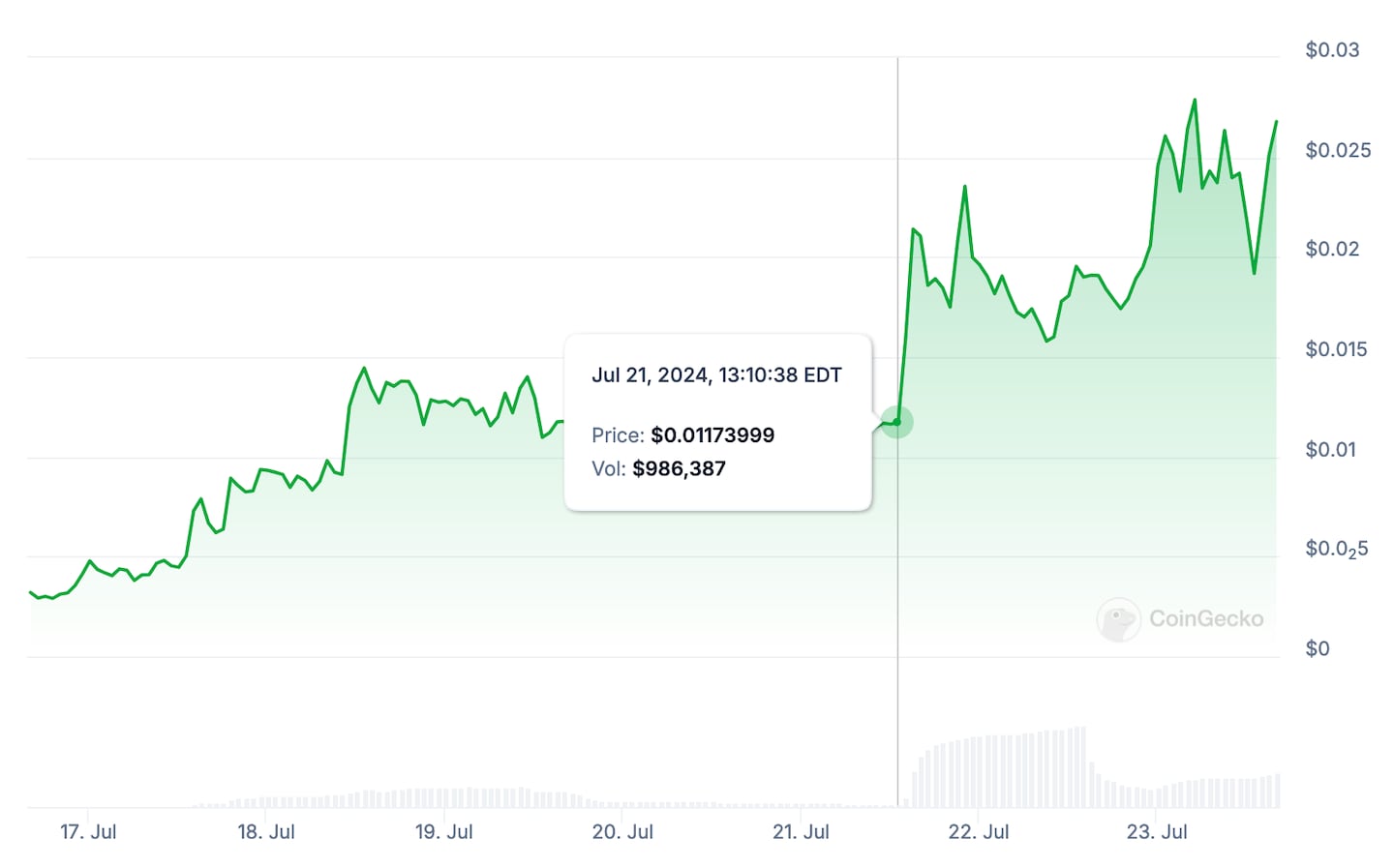A version of this article appeared in our The Decentralised newsletter on July 23. Sign up here.
GM, Aleks here.
Here’s what caught my DeFi-eye recently:
- Why EigenLayer is losing steam.
- One Ethereum group is trying to get ahead of DeFi regulations.
- A wrinkle in the $125 million Multichain mystery.
EigenLayer cools off
EigenLayer started the year on a tear.
The protocol that pioneered “restaking” launched in June 2023. But after folks like Ethereum co-founder Vitalik Buterin warned it could destabilise Ethereum, EigenLayer capped its own growth at the outset, limiting how much crypto users could deposit.
Early this year, it lifted those caps.
Within a month, it became the second-largest protocol on Ethereum. As of February 1, EigenLayer users had deposited a little more than $2 billion in crypto.
By March 1, that figure was just under $10 billion.
Venture capitalists got in on the action. Andreessen Horowitz invested $100 million. Affiliated “liquid restaking” projects raised millions, too.
At the time, I wondered: How much of EigenLayer’s value came from users who really believed the protocol was a “groundbreaking evolution” and how much came from the “airdrop farmers” using it as their latest cash cow?
We’re getting our answer now.
The total value of crypto in EigenLayer peaked in June at $20 billion. It’s since fallen to just under $16 billion.
That’s because airdrop farmers are leaving, according to one analyst. Now that restaking airdrops have come and gone, investors seek greener pastures.
But it isn’t all bad.
“Restaking will continue to be a massive market, and an important influence on the overall Ethereum network,” the analyst, Ian Unsworth of Kairos Research, told me.
A DeFi handbook?
While politicians and regulators pass laws that cover stablecoins, centralised exchanges, and crypto-based exchange-traded funds, they’ve largely steered clear of DeFi.
Make no mistake, though: Those regulations will come. And one project is trying to get ahead of the next regulatory onslaught.
The Enterprise Ethereum Alliance, an industry group, has released its DeFi Risk Assessment Guidelines, an in-depth handbook detailing the risks involved in working with DeFi and how to assess, manage, account for, and mitigate them.
The guidelines will enable DeFi protocols to take a proactive approach to compliance, while also helping regulators draft regulation that doesn’t stifle innovation.
Regulators in the United Arab Emirates and the European Union are already using the EEA’s guidelines, according to Dyma Budorin, co-chair of the EEA’s DRAMA working group and CEO of blockchain security firm Hacken.
Budorin said the handbook will be useful to traditional financial institutions that are considering jumping into DeFi.
“They don’t know what DeFi risks are, and that’s why they don’t step into DeFi,” he told us. “DeFi protocols that plan to cooperate with old money can use the DeFi Risk Assessment Guidelines as best practice references.”
Multichain hack
When crypto bridge Multichain shuttered last summer, citing pressure from Chinese police and an apparent $125 million hack, Fantom Foundation CEO Michael Kong dismissed speculation that it was an inside job.
He isn’t so sure anymore.
Kong, whose firm lost money in the hack, tells me he can’t rule out that someone affiliated with Multichain made off with the loot.
The Fantom Foundation has made a similar accusation in a Singapore court.
“I was a little bit too trusting of what Multichain was saying to us,” Kong said.
The Fantom Foundation was able to confirm that Multichain CEO Zhaojun He was arrested and is awaiting charges.
It was also able to confirm that other employees were arrested, though they were eventually released.
While none of the information is conclusive, certain facts have fanned suspicion that last summer’s event wasn’t a garden-variety hack.
First of all, the movement of the stolen crypto post-hack was highly unusual.
Second, Multichain briefly reopened in November, allowing someone to make a complicated, lightning quick arbitrage trade for $1 million.
“We believe it to be someone (or some individuals) from Multichain’s former team,” Kong said.
A Multichain representative could not be reached for comment. The company has not defended itself at any stage in Fantom’s lawsuit in Singapore, which began in 2023.
And a person familiar with the inner workings of Multichain told DL News the company’s team didn’t plan an inside job.
“The truth will be known when the police make the case public,” said the person, who requested anonymity out of concern for their family in China.
Data of the week
Keep an eye on political memecoins, which have been fluctuating wildly amid the political chaos in the US.
On Sunday, President Joe Biden dropped out of the race and endorsed Vice President Kamala Harris.
Doland Tremp, a memecoin based on Republican candidate Donald Trump, soared 30% to about 55 cents.
Jeo Boden, a play on the president’s name, plunged 59% to about one cent.
A token dubbed Kamala Horris (chart below) skyrocketed 131%.

This week in DeFi governance
VOTE: Arbitrum seeks members for Gaming Catalyst Program council
VOTE: Arbitrum wants to oust DeFi aggregator for “misuse” of grant money
VOTE: Aave considers adding Ethena’s USDe as collateral
Post of the week
Happy birthday to a very special digital asset.
ETH is 10 years old today!
— Justin.eth Drake (@drakefjustin) July 22, 2024
The ether ICO started July 22, 2014. Back then ETH was sold on Bitcoin at a rate of 2,000 ETH per 1 BTC—totally permissionless, no VCs, no vesting.
Today 1 BTC buys less than 20 ETH. Few assets have outperformed BTC over 10 years; even fewer have…
What we’re watching
This is a neat innovation in KYC. If you pass Binance's due diligence process, you can mint a token that proves this fact, then export your proof-of-KYC to various DeFi tools, including mixers, that proactively screen out bad actors.https://t.co/qLYgh68Vhb
— John Paul Koning (@jp_koning) July 19, 2024
Thoughts? pic.twitter.com/89p73dCadw
There have been several proposals to find common ground between crypto and the government.
One oft-discussed idea would be to use zero-knowledge technology to vet customers, and create a sort of digital passport they can use from one DeFi protocol to the next. Binance, the world’s largest crypto exchange, has just launched its own crypto passport, which it’s calling an “Binance Account Bound Token.”
But will it really satisfy lawmakers and regulators?
Got a tip about DeFi? Reach out at aleks@dlnews.com.


